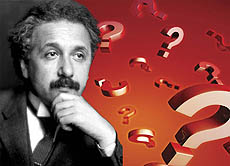The twin paradox
 |
| The twin paradox is a classic seeming conundrum of Einstein's theory of special relativity. Today's column explains why it is important that the word "seeming" is added. In reality, there is no paradox. |
In my last column, I discussed the fact that time passes slower for clocks that are moving at high velocity, and I showed that the Fermilab MINOS beamline proves that the predictions of relativity are right.
However, one must be very careful. The "relativity" in the theory's name comes from the absolute core premise of Einstein's idea, which is that nothing is absolute. If you are standing on a train platform and a train whizzes by, you would say that a person on the train is moving. On the other hand, a person sitting on the train would say that he is stationary and that you are moving. Relativity says that both of you are right. Who is moving and who is stationary is just a matter of perspective, and the laws of physics must work equally well for both people.
But this raises a conundrum when applied to the question of moving clocks. How can moving clocks tick more slowly than stationary ones if the question of who is moving is a matter of opinion? If I can say you are moving and your clock is slow, and if you can say I am moving and my clock is slow, something is inconsistent.
This longstanding question about special relativity is called the twin paradox. Suppose one in a set of twins sets off in a spaceship, travels to a distant star and then returns. On both legs of the trip, he accelerates to high velocity and then coasts for most of the journey. According to the "moving clocks tick slower" premise, the twin who stays on Earth will have experienced one duration, while the traveling twin will have experienced another, slower duration. The spacefaring twin will return to Earth younger than his homebody brother.
"But wait," says the traveling twin, "according to my definition, I was just sitting there on my stationary spaceship while the Earth zoomed away from me and then zoomed back. By all rights, Earth twin should be younger!"
The solution to this seeming paradox has to do with the idea of a reference frame, which is central to special relativity. "Reference frame" is just a fancy term that means "the world according to me," putting each person at the center of his or her universe. All "inertial" observers — those who don't experience any acceleration — will agree that the homebody never changed his reference frame. He just sat there. Similarly, all observers will agree that the traveler lived in two reference frames, one moving away from Earth and one returning. Any third observer coasting through space will see that the homebody's velocity doesn't change while the traveler's velocity does.
The law of relativity takes the traveler's two reference frames into account. Thus the so-called paradox isn't really a paradox. While the question of who is moving is a matter of opinion, the question of who has experienced two reference frames is not.
Some readers, probably including some of my doctoral-holding colleagues at Fermilab, will claim that the difference between the two twins is that one of the two has experienced an acceleration. (After all, that's how he slowed down and reversed direction.) However, the relativistic equations don't include that acceleration phase; they include just the coasting time at high velocity. For the professional (or the brave), I work out the predictions of relativity. That one twin inhabits two frames is the only thing that matters.
The twin paradox is one of those mind-bending questions you encounter as you first begin to explore the predictions of relativity, but don't be fooled: It really isn't a paradox at all. Keep that in mind as you explore other explanations that may resonate with you — the well-known ones posted by physicist John Baez, a video by Neil deGrasse Tyson, the idea of acceleration, or my own description here of one twin being in one frame.
Embracing the twin paradox is an important first step as you dip your toe into the nonintuitive world of special relativity. If you dig a little deeper into the links given here (and show a little determination), hopefully you'll begin to be more comfortable that Einstein really was right.
—Don Lincoln
Want a phrase defined? Have a question? Email today@fnal.gov.
|